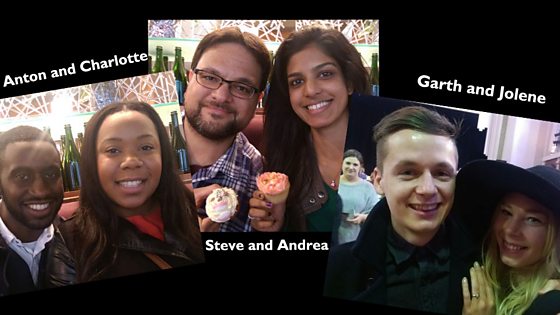Unit 9: The big wedding
Present continuous and 'going to' for future
Select a unit
- 1 Nice to meet you!
- 2 What to wear
- 3 Like this, like that
- 4 The daily grind
- 5 Christmas every day
- 6 Great achievers
- 7 The Titanic
- 8 Travel
- 9 The big wedding
- 10 Sunny's job hunt
- 11 The bucket list
- 12 Moving and migration
- 13 Welcome to BBC Broadcasting House
- 14 New Year, New Project
- 15 From Handel to Hendrix
- 16 What's the weather like?
- 17 The Digital Revolution
- 18 A detective story
- 19 A place to live
- 20 The Cult of Celebrity
- 21 Welcome to your new job
- 22 Beyond the planets
- 23 Great expectations!
- 24 Eco-tourism
- 25 Moving house
- 26 It must be love
- 27 Job hunting success... and failure
- 28 Speeding into the future
- 29 Lost arts
- 30 Tales of survival
Session 2
This time we look at the differences between present continuous and going to. We do an activity to help us learn the rules, and then practise by listening to a conversation between a married couple: Marco and Flavia. After that we have 6 Minute Grammar!
Activity 1
The rules
Planning for the future

In Session 1 we met three couples who were planning their weddings.
One of the couples was Steve and Andrea. They said this about their wedding:
- We're getting married in July next year.
- It's going to be a big mix of food from all over the world.
And here are a few similar examples:
- We're also going to have some traditional English food, like bacon sandwiches and other things.
- We're having bacon sandwiches and onion soup at our wedding.
- We're going to have a church wedding in the morning, but we're not sure where.
- We're having a church wedding. We booked the church last week.
By looking at these examples, can you work out the rules about when to use going to and when to use the present continuous?
Try the activity
Work out the rules
3 Questions
Answer the questions about 'going to' and the present continuous
Help
Activity
Answer the questions about 'going to' and the present continuous
Hint
"I'm getting married in July."Question 1 of 3
Help
Activity
Answer the questions about 'going to' and the present continuous
Hint
"We're going buy a house this year."Question 2 of 3
Help
Activity
Answer the questions about 'going to' and the present continuous
Hint
"We're coming home next week."Question 3 of 3
Excellent! Great job! Bad luck! You scored:
Summary: Going to and present continuous
Use going to
To talk about something that we have decided to do in the future, but not arranged yet. It’s possible that the plan might change.
- When I finish at college, I’m going to spend a year travelling.
Use the present continuous
To talk about the future when we have already arranged to do something. It’s definite, not just an idea. Perhaps we have put the arrangement in our diaries.
- ‘Are you free at 2 o’clock on Tuesday?’
- ‘No, I’m meeting a client.’
Actually, the uses of the present continuous and going to are very similar and you can often use either of them, with little or no change in meaning.
- I'm going to travel around Asia next year.
- I'm travelling around Asia next year.
For more grammar help, visit the Grammar Reference.
Next
Next it's time to meet a young couple called Marco and Flavia and test how much of the new language you can use.